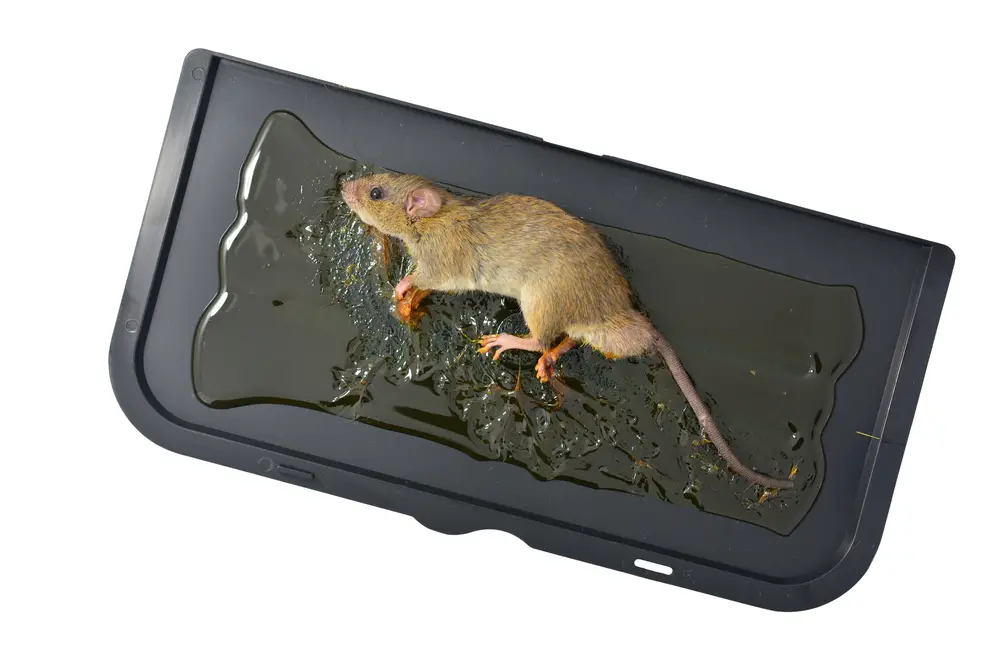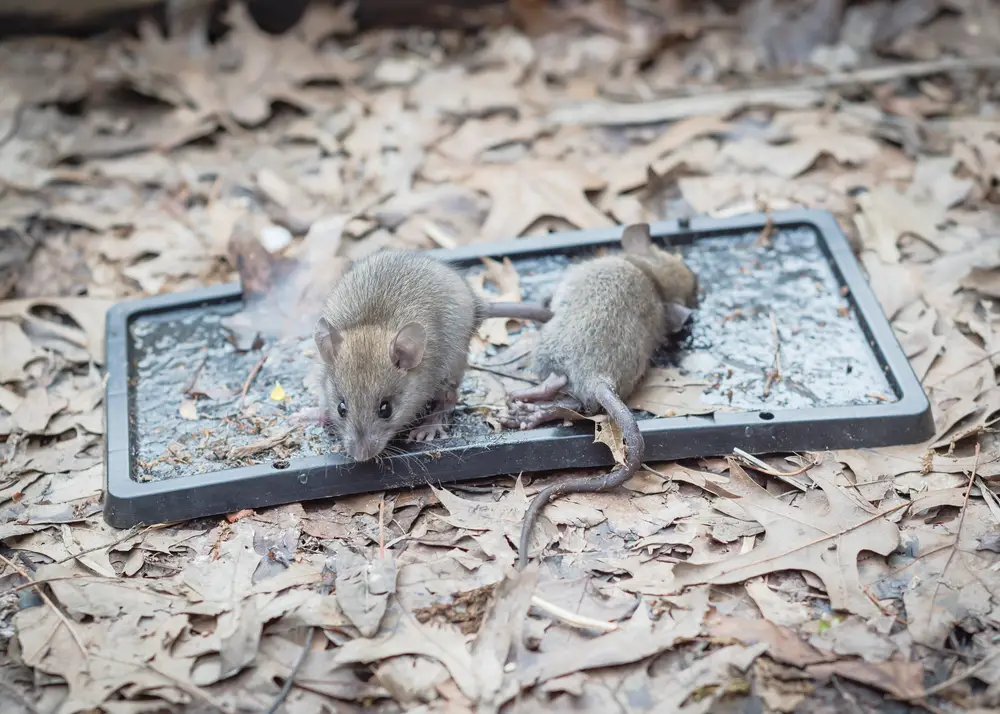Glue traps are a common method for capturing and controlling rodent populations. However, the effectiveness of these traps can be a topic of debate.
A frequently asked question is whether mice are smart enough to discern and avoid glue traps when they encounter them.
Quick Answer:
Mice don’t naturally avoid glue traps, but as cautious creatures, they might shy away from new objects, including traps. Mice that have escaped a glue trap could learn to avoid them. For success, place traps where mouse activity is seen, using bait to lure them in.
Mice are intelligent creatures with keen senses and problem-solving capabilities.
By examining how mice interact with glue traps and the extent of their learning capabilities, we can employ more effective strategies for controlling their populations, ensuring a better living environment.
Understanding Glue Traps
Glue traps are a type of mouse trap used to catch mice and other small rodents. They are usually cheap and can be placed in hidden places around your home to catch unsuspecting pests. In this section, we will discuss the pros and cons of glue traps, as well as some alternatives.
- 🐭【Ultra-Strong Adhesive】Our Mouse Glue Trap features an ultra-strong glue that ensures maximum effectiveness in capturing mice. The powerful glue secures the rodents firmly, preventing any…
- 🎯【Easy to Use】Designed with convenience in mind, our mouse trap is incredibly easy to set up and deploy. Simply place it in areas where mice are commonly spotted, such as along walls, near food…
- 🌿【Safe and Non-Toxic】Rest assured, our rat glue trap is a safe and non-toxic option for rodent control, making it an ideal choice for households with children or pets. Keep your loved ones…
Pros of Glue Traps
Glue traps offer some advantages compared to other types of mouse traps:
- Affordability: They are generally less expensive than other trapping methods.
- Ease of use: You can easily set up and place them in hidden locations.
- Non-toxic: They do not contain poison, making them safer for households with pets or children.
Cons of Glue Traps
Despite their benefits, glue traps have some downsides:
- Inhumane: Mice caught in glue traps can suffer from starvation and may suffocate as they struggle to free themselves.
- Messy: Removing the trapped rodents can be difficult and unpleasant.
Alternatives to Glue Traps
If you’re looking for a more humane and effective way to catch mice, consider these alternatives:
- Snap traps: These traditional mouse traps kill mice quickly and relatively painlessly.
- Humane traps: These traps capture the mouse alive, allowing you to release it outside.
- Poison baits: While not the most humane option, poison baits are effective in controlling rodent populations. Be cautious, though, as these can pose a risk to pets and children.
Do Mice Know to Avoid Glue Traps?
Mice Instincts and Behavior
Mice are intelligent creatures and can easily sense when something is different in their environment. They are constantly on high alert, making use of their instincts to navigate through their surroundings.
When a new object, such as a glue trap, is placed in their path, mice may be cautious and initially avoid it until they become familiar with it. This natural caution is part of their rodent control strategy and helps them to avoid potential dangers.
Mice Sense of Smell
A mice’s sense of smell is one of their most vital tools for survival. They use it to locate food, communicate with other mice, and detect potential threats. This keen sense of smell can also help them detect glue traps.
Because mice have the ability to detect the scent of the glue used in traps, they may be more inclined to avoid those that emit a strong odor. Additionally, mice are known to mark their territory with urine, which not only serves as a form of communication but also helps them detect foreign objects like glue traps.
Other Factors Affecting Trap Avoidance
Other factors can influence a mouse’s ability to avoid glue traps:
- Dust and debris: Mice are more likely to approach a trap that looks like it has been in use for a while. As dust and debris accumulate on the trap, it becomes less noticeable, increasing the chances of a mouse stumbling onto it.
- Location: Mice have specific pathways they follow to move around. Placing a trap directly in their pathway will increase the likelihood of it being noticed and avoided. To up your chances of trapping mice, place traps near their nesting or feeding areas.
- Direct sunlight: Mice prefer dark and hidden environments, so placing glue traps in direct sunlight may deter them from coming close to the trap. Instead, place the traps in dimly lit or shady areas where mice are more likely to be present.
Effective Glue Trap Use

Choosing the Right Bait
Selecting the appropriate bait is crucial for successfully using glue traps. Some popular bait choices for mice include peanut butter and nesting material, such as soft materials or small pieces of string. These entice mice to come close to the trap and increase the chances of capture.
Proper Trap Placement
To effectively use glue traps, it’s important to place them in areas with high rodent activity, where you’ve noticed signs of mice presence, like droppings and gnawed materials.
Position traps near walls and in tight places where mice tend to travel. Placing multiple traps in these areas further increases the probability of capturing the target.
Keeping Traps Clean and Effective
To maintain the efficiency of your glue traps, ensure they’re clean and free of debris. Mice may avoid traps that have a human scent. Therefore, wear gloves when handling the traps to eliminate the transfer of human odors.
Choosing cardboard or plastic traps can make cleaning easy, as you can simply dispose of and replace these when they become dirty.
Safety and Precautions when Using Glue Traps
Dealing with Struggling Mice
If you find a still-alive mouse struggling on a glue trap, try your best to remain calm. It’s a good idea to wear gloves to protect yourself from any potential disease transmission. Gently use a soft tool like a cotton swab dipped in vegetable oil to help soften and release the adhesive.
Remember that mice can become frightened and may bite, so consider releasing it outdoors or contacting a professional to handle it humanely.
- Rat glue board
- Country of origin: United States
- No assembly required
Disposing of Dead Mice
When disposing of a dead mouse, always wear gloves. Use a plastic bag to cover your hand, and carefully grab the dead mouse and the glue trap. Seal the bag tightly and dispose of it in a trash receptacle. Don’t forget to wash your hands thoroughly with soap and water afterward.
Handling Rodent Infestations
If you have a severe rodent infestation in your home, it’s important to take the appropriate steps to eliminate mice safely. Keep in mind that glue traps might not be the most humane option.
Consider:
- Consulting with a professional pest control service
- Using snap traps that kill mice more quickly and humanely
- Sealing up entry points to prevent mice from entering your home
Always keep glue traps and other rodent control methods out of reach of children and pets.
Protecting Against Insects and Rats
Glue traps may not only attract mice, but they can also capture insects and even rats. To protect your home against these pests:
- Regularly clean and maintain both the interior and exterior of your property
- Seal gaps, cracks, and crevices around your home to block entry
- Use pest control products specifically designed for insects or rats as needed
- Keep food in sealed containers, and clean up any spills or crumbs quickly
Mice have a certain level of awareness when it comes to avoiding glue traps.
Their keen sense of smell and curiosity can sometimes work against them, leading them to investigate these traps. However, their natural instincts and ability to learn from the experiences of fellow mice can help them evade these traps.




